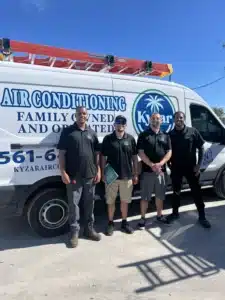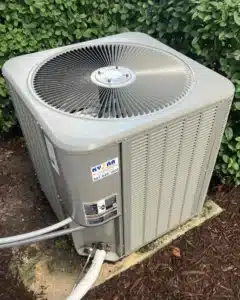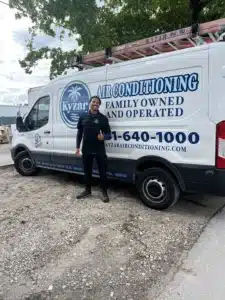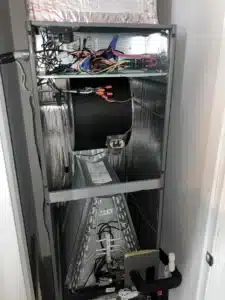What to Expect During a Professional HVAC Service Visit
For many Florida homeowners, scheduling HVAC service feels like a...
Indoor air quality is a big deal, especially in commercial buildings. In Florida, with its high humidity and warm temperatures, the stakes are even higher. From offices to retail spaces, the air people breathe matters. Poor air quality can make workers less productive, lead to higher absenteeism, and even affect how customers view your business. Here’s how to improve indoor air quality effectively and create a better environment for everyone.
Florida’s unique climate presents specific challenges to maintaining good air quality. Humidity levels can make a space feel stuffy and uncomfortable, while airborne allergens and mold spores are more common due to the damp conditions. Knowing what you’re up against can help you choose the right solutions.
Improving air quality begins with understanding your current situation. Conduct an indoor air quality assessment to identify existing problems. This might involve hiring a professional to measure pollutants like volatile organic compounds (VOCs), carbon dioxide, or particulate matter. Some commercial buildings may have built-in monitoring systems, but a comprehensive evaluation can highlight areas for improvement.
A well-functioning ventilation system is crucial for fresh air circulation. Ensure that your HVAC system is properly designed to handle the building’s size and occupancy levels. In Florida’s climate, it’s also essential to have systems that can effectively manage humidity. If your current setup isn’t doing the job, consider an upgrade or retrofit. Bringing in fresh, filtered outdoor air helps reduce pollutants and keeps the environment healthy.
Air filters are the first line of defense against dust, pollen, and other airborne particles. Commercial buildings should use high-efficiency filters, such as HEPA or MERV-rated filters, to capture smaller contaminants. These filters need regular replacement or cleaning, depending on your system’s needs. Keeping up with this maintenance step ensures optimal performance and contributes to cleaner air.
Managing humidity is a constant battle in Florida. High humidity can promote mold growth, damage building materials, and make occupants uncomfortable. An HVAC system equipped with a dehumidifier can maintain ideal indoor humidity levels, typically between 30% and 50%. Be mindful of condensation around windows and ductwork, as excess moisture can lead to mold issues. Regularly inspect and address any signs of dampness to keep your space dry and healthy.
Over time, air ducts can collect dust, allergens, and even mold. Dirty ducts can spread contaminants throughout your building, lowering air quality. Schedule regular duct cleanings to keep your ventilation system running efficiently. In some cases, sealing ductwork can also prevent contaminants from infiltrating the air supply. A well-maintained duct system makes a noticeable difference in the freshness of your indoor environment.
In some areas of your building, air purifiers can be beneficial. These devices are especially helpful in high-traffic zones or rooms where ventilation is limited. Look for purifiers with HEPA filters or activated carbon to trap pollutants and eliminate odors. In Florida’s humid climate, consider purifiers with built-in dehumidifying features for an added layer of air quality improvement.
Adding plants to your commercial space can be a simple yet effective way to enhance air quality. Certain indoor plants, like snake plants and peace lilies, naturally filter toxins from the air. Besides improving air quality, greenery adds a touch of nature to your workspace, making it more inviting and calming. Just be sure to choose plants that thrive indoors and are easy to care for in a commercial environment.
Everyone plays a role in maintaining good indoor air quality. Encourage employees and visitors to be mindful of their impact. Simple actions, like avoiding aerosol sprays or reporting issues like water leaks, can go a long way. You might also consider implementing a policy to limit the use of cleaning products with harsh chemicals. Providing guidelines on indoor air quality helps people stay aware and engaged.
Routine maintenance of your HVAC system is essential in Florida’s demanding climate. Schedule regular check-ups to ensure your system is working efficiently. Technicians should inspect and clean components, check for wear and tear, and make adjustments as needed. Well-maintained HVAC systems not only improve air quality but also reduce energy costs, saving your business money in the long run.
Mold is a common concern in humid environments like Florida. Once it takes hold, mold can spread quickly and degrade air quality. Keep an eye out for any signs of mold, such as musty odors or visible growth, and address them immediately. Preventative measures include controlling humidity, repairing leaks, and ensuring proper drainage around your building’s foundation. If mold becomes an issue, professional remediation is necessary to keep the air safe.
Modern HVAC systems come with smart controls that can adjust temperature, humidity, and airflow based on occupancy and environmental factors. These systems can also alert you to potential issues before they become serious problems. Investing in smart technology can make managing indoor air quality more straightforward and efficient, especially for large commercial buildings.
If you’re remodeling or upgrading your commercial space, opt for low-emission building materials, paints, and furnishings. Many common products release VOCs into the air, contributing to poor air quality. By choosing materials that are certified for low emissions, you can create a healthier indoor environment right from the start.
Cleaning supplies often contain harsh chemicals that release fumes into the air. Whenever possible, use eco-friendly or low-VOC alternatives. Store these supplies properly to prevent accidental leaks or spills. In addition, ensure that any commercial cleaning services you use follow environmentally friendly practices.
Improving indoor air quality in commercial spaces doesn’t have to be complicated. By taking proactive steps and investing in the right equipment, you can create a healthier, more comfortable environment. Florida’s climate presents unique challenges, but with the right strategies, you can keep your indoor air clean and safe.
Investing in the comfort and well-being of those in your building is a decision that pays off in many ways. When you focus on improving air quality and stay proactive with regular HVAC maintenance, you create a healthier and more pleasant environment for both employees and visitors. A clean, well-ventilated space not only boosts productivity but also leaves a positive impression on anyone who steps inside. Don’t wait until air quality issues become a major problem—contact an experienced HVAC professional today for guidance and solutions. By taking action now, you’ll ensure that your building thrives with better air quality and a more comfortable atmosphere.

For many Florida homeowners, scheduling HVAC service feels like a...

In a warm coastal climate like West Palm Beach, air...

Living in West Palm Beach means living with heat, humidity,...

Florida HVAC systems work harder than those in almost any...

Indoor air quality plays a major role in how a...

Ventilation is one of the most important yet often overlooked...